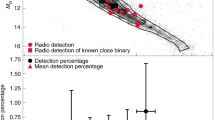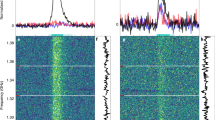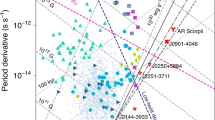Abstract
Wlerick and Véron1 have suggested that there is a new class of radio objects—namely, radio stars. This suggestion was based on a search in the positions of 3C (revised) radio sources having ∣bII∣ > 30° for which no identification with an optical object had been made. The search led to the discovery of apparent coincidences between the positions of seven radio sources and those of objects with normal stellar spectra and mv≲20.
This is a preview of subscription content, access via your institution
Access options
Subscribe to this journal
Receive 51 print issues and online access
$199.00 per year
only $3.90 per issue
Buy this article
- Purchase on Springer Link
- Instant access to full article PDF
Prices may be subject to local taxes which are calculated during checkout
Similar content being viewed by others
References
Wlerick, G., and Véron, P., Ann. Astrophys., 30, 341 (1967).
Elsmore, B., Kenderdine, S., and Ryle, M., Mon. Not. Roy. Astro. Soc., 134, 87 (1966).
Macdonald, G. H., Kenderdine, S., and Neville, A. C., Mon. Not. Roy. Astro. Soc. (in the press).
Wyndham, J. D., Ap. J., 144, 459 (1966).
Author information
Authors and Affiliations
Rights and permissions
About this article
Cite this article
MACKAY, C. Do Radio Stars Exist?. Nature 216, 1091–1092 (1967). https://doi.org/10.1038/2161091a0
Received:
Published:
Issue Date:
DOI: https://doi.org/10.1038/2161091a0
This article is cited by
-
A finite expanding universe with matter injection
Il Nuovo Cimento B (1972)
-
On the Optical Identification of 3C 230
Nature (1969)
Comments
By submitting a comment you agree to abide by our Terms and Community Guidelines. If you find something abusive or that does not comply with our terms or guidelines please flag it as inappropriate.



